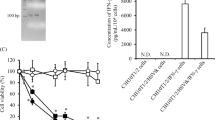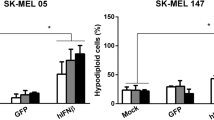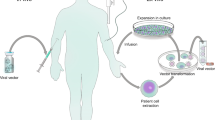Abstract
A recombinant adenovirus expressing human interferon α2b driven by the cytomegalovirus promoter, IACB, was shown to produce and secrete biologically active protein in vitro and in vivo. Intravenous administration of IACB in Buffalo rats resulted in circulating levels of biologically active human interferon at 70,000 international units/mL for up to 15 days. Distribution of interferon protein after IACB administration was different from that seen with the subcutaneous delivery of interferon protein. Higher levels of interferon protein were observed in liver and spleen after IACB delivery compared to protein delivery. The antitumor efficacy of IACB, as measured by suppression of tumor growth, was tested in athymic nude mice bearing established human tumor xenografts from different types of human cancer. Subcutaneous tumors most responsive to the intratumoral administration of IACB ranked as U87MG (glioblastoma) and K562 (chronic myelogenous leukemia), followed by Hep 3B (hepatocellular carcinoma) and LN229 cells (glioblastoma). Intravenous administration of IACB in animals bearing U87MG or Hep 3B xenografts was also effective in suppressing tumor growth, although to a lesser extent than the intratumoral administration. IACB was also tested in a metastatic model in beige/SCID mice generated with H69 (small cell lung carcinoma) cells and was found to prolong survival in tumor-bearing animals. This suggested that interferon gene delivery can be effective in suppressing tumor growth in a wide variety of cells. Cancer Gene Therapy (2001) 8, 788–795
This is a preview of subscription content, access via your institution
Access options
Subscribe to this journal
Receive 12 print issues and online access
$259.00 per year
only $21.58 per issue
Buy this article
- Purchase on Springer Link
- Instant access to full article PDF
Prices may be subject to local taxes which are calculated during checkout
Similar content being viewed by others
References
Bordens R, Grossberg SE, Trotta PP, et al . Molecular and biologic characterization of interferon α2b Semin Oncol 1987 24: 41–51
Gutterman JU . Cytokine therapeutics: lessons from interferon α Proc Natl Acad Sci USA 1994 91: 1198–1205
Pfeffer LM, Dinarrello CA, Herberman RB, et al . Biological properties of recombinant alpha-interferons: 40th anniversary of the discovery of interferons Cancer Res 1998 58: 2489–2499
Einhorn S, Grander D . Why do so many cancer patients fail to respond to interferon therapy J Interferon Cytokine Res 1996 16: 275–281
Gutterman JU, Fine S, Quesada J, et al . Recombinant leukocyte A interferon: pharmacokinetics, single-dose tolerance and biologic effect in cancer patients Ann Intern Med 1982 96: 549–556
Zhang J, Hu C, Geng Y, et al . Treatment of a human breast xenograft with adenovirus vector containing an interferon gene results in rapid regression due to viral oncolysis and gene therapy Proc Natl Acad Sci USA 1996 93: 4513–4518
Ahmed CMI, Sugarman BJ, Johnson DE, et al . In vivo tumor suppression by adenovirus-mediated interferon α2b gene delivery Hum Gene Ther 1999 10: 77–84
Tuting T, Gambotto A, Baar J, et al . Interferon α gene therapy for cancer: retroviral transduction of fibroblasts and particle-mediated transfection of tumor cells are both effective strategies for gene delivery in murine tumor models Gene Ther 1997 4: 1053–1060
Mecchia M, Matarrese P, Malorni, et al . Type I consensus interferon gene transfer into human melanoma cells up-regulates p53 and enhances cis -platin–induced apoptosis: implications for new therapeutic strategies with interferon alpha Gene Ther 2000 7: 167–179
Coleman M, Muller S, Quezada A, et al . Nonviral interferon α gene therapy inhibits growth of established tumors by eliciting a systemic immune response Hum Gene Ther 1998 9: 2223–2230
Horton HM, Anderson D, Hernandez P, et al . A gene therapy for cancer using intramuscular injection of plasmid DNA encoding interferon α Proc Natl Acad Sci USA 1999 96: 1553–1558
Diserens AC, de Tribolet N, Martin-Achard A, et al . Characterization of an established human malignant glioma cell line: LN-18 Acta Neuropathol (Berlin) 1981 53: 21–28
Wills KN, Huang W, Harris MP, et al . Gene therapy for hepatocellular carcinoma: chemosensitivity conferred by adenovirus-mediated transfer of the HSV-1 thymidine kinase gene Cancer Gene Ther 1995 2: 191–197
Huyghe BG, Liu X, Sutjipto S, et al . Purification of a type 5 recombinant adenovirus encoding human p53 by column chromatography Hum Gene Ther 1995 6: 1403–1416
Shabram PW, Giroux DD, Goudreau AM, et al . Analytical anion-exchange HPLC of recombinant type 5 adenoviral particles Hum Gene Ther 1995 8: 453–465
Shabram P, Aguilar-Cordova E . Multiplicity of infection/multiplicity of confusion Mol Ther 2000 2: 420–421
Obenauer-Kutner LJ, Jacobs SJ, Kolz K, et al . A highly sensitive electrochemiluminescence immunoassay for interferon α2b in human serum J Immunol Methods 1997 206: 25–33
Wen SF, Xie L, McDonald M, et al . Development and validation of sensitive assays to quantitate gene expression after p53 gene therapy and paclitaxel chemotherapy using in vivo dosing in tumor xenograft models Cancer Gene Ther 2000 Nov 7: 1469–1480
Armentano D, Smith MP, Sookdeo CC, et al . E4ORF3 requirement for achieving long-term transgene expression from the cytomegalovirus promoter in adenovirus vectors J Virol 1999 73: 7031–7034
Dinney CPN, Bielenberg DR, Perrotte P, et al . Inhibition of basic fibroblast growth factor expression, angiogenesis and growth of human bladder carcinoma in mice by systemic interferon α administration Cancer Res 1998 58: 808–814
Belardelli F, Gresser I . The neglected role of type I interferon in the T cell response: implications for its clinical use Immunol Today 1996 17: 369–372
Karavodin LM, Robbins J, Chong K, et al . Generation of a systemic antitumor response with regional intratumoral injections of interferon g retroviral vector Hum Gene Ther 1998 9: 2231–2241
James CD, Carlbom E, Nordenskjold M, et al . Chromosome 9 deletion mapping reveals interferon α and interferon β-1 deletions in human glial tumors Cancer Res 1993 51: 1684–1688
Kirkwood JM, Ernstoff MS, Davis CA, et al . Comparison of intramuscular and intravenous recombinant alpha-2 interferon in melanoma and other cancers Ann Intern Med 1985 103: 32–36
Rivera VM, Ye X, Courage NL, et al . Long-term regulated expression of growth hormone in mice after intramuscular gene transfer Proc Natl Acad Sci USA 1999 96: 8657–8662
Burcin MM, Schiedner G, Kochanek S, et al . Adenovirus-mediated regulatable target gene expression in vivo Proc Natl Acad Sci USA 1999 96: 355–360
Acknowledgements
We thank Drs. Stephen Chang and Robert Ralston for their support and suggestions, Drake LaFace for reading the manuscript, Doug Cornell and Suganto Sutjipto for virus production, Susan Miller for determination of viral particle concentration, and Debbie Muilwijk for animal husbandry.
Author information
Authors and Affiliations
Corresponding author
Rights and permissions
About this article
Cite this article
Iqbal Ahmed, C., Johnson, D., Demers, G. et al. Interferon α2b gene delivery using adenoviral vector causes inhibition of tumor growth in xenograft models from a variety of cancers. Cancer Gene Ther 8, 788–795 (2001). https://doi.org/10.1038/sj.cgt.7700364
Received:
Published:
Issue Date:
DOI: https://doi.org/10.1038/sj.cgt.7700364
Keywords
This article is cited by
-
Next generation drugs in urothelial cancer: adenoviruses in the treatment of BCG-unresponsive nonmuscle invasive bladder cancer
memo - Magazine of European Medical Oncology (2023)
-
Direct and indirect effects of IFN-α2b in malignancy treatment: not only an archer but also an arrow
Biomarker Research (2022)
-
The development of interferon-based gene therapy for BCG unresponsive bladder cancer: from bench to bedside
World Journal of Urology (2019)
-
Aspirin enhances IFN-α-induced growth inhibition and apoptosis of hepatocellular carcinoma via JAK1/STAT1 pathway
Cancer Gene Therapy (2013)
-
Intratumoral interferon-α gene transfer enhances tumor immunity after allogeneic hematopoietic stem cell transplantation
Cancer Immunology, Immunotherapy (2009)



